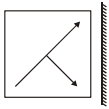A mark on the surface of sphere (µ = 3/2) is viewed from a diametrically opposite position. It appears to be at a distance \(15~\mathrm{cm}\) from its actual position. The radius of sphere is:
1. 15 cm
2. 5 cm
3. 7.5 cm
4. 2.5 cm
1. 15 cm
2. 5 cm
3. 7.5 cm
4. 2.5 cm
A light ray from the air is incident (as shown in the figure) at one end of glass fibre (refractive index µ = 1.5) making an incidence angle of 60° on the lateral surface so that it undergoes a total internal reflection. How much time would it take to traverse the straight fibre of a length of 1 km?
1. 3.33
2. 6.67
3. 5.77
4. 3.85
Choose the correct mirror image of the figure:

| 1. |  |
2. |  |
| 3. |  |
4. |  |
If there had been one eye of a man, then:
| 1. | image of the object would have been inverted |
| 2. | visible region would have decreased |
| 3. | image would have not been seen in three dimensional |
| 4. | Both (2) and (3) |
The near point of a person is 50 cm and the far point is 1.5 m. The spectacles required for reading purposes and for seeing distant objects are respectively:
1. + 2D, \(-\frac{2}{3}~D\)
2. \(+\frac{2}{3}~D\), - 2 D
3. - 2 D, \(+\frac{2}{3}~D\)
4. \(-\frac{2}{3}~D\), + 2 D
An astronomical refracting telescope will have large angular magnification and high angular resolution when it has an objective lens of:
| 1. | Small focal length and large diameter |
| 2. | Large focal length and small diameter |
| 3. | Large focal length and large diameter |
| 4. | Small focal length and small diameter |
An air bubble in a glass slab with refractive index 1.5 (near-normal incidence) is 5 cm deep when viewed from one surface and 3 cm deep when viewed from the opposite face. The thickness (in cm) of the slab is:
| 1. | 8 | 2. | 10 |
| 3. | 12 | 4. | 16 |
If the focal length of the objective lens is increased, then magnifying power of:
| 1. | microscope will increase but that of telescope decrease |
| 2. | microscope and telescope both will increase |
| 3. | microscope and telescope both will decrease |
| 4. | microscope will decrease but that of the telescope will increase |
A ray of light is incident at an angle of incidence, i, on one face of a prism of angle A (assumed to be small) and emerges normally from the opposite face. If the refractive index of the prism is , the angle of incidence i is nearly equal to:
| 1. | \(\mu \mathrm{A} \) | 2. | \(\frac{\mu A}{2} \) |
| 3. | \(A / \mu \) | 4. | \(A / 2 \mu\) |
A concave mirror of the focal length is placed at a distance of d from a convex lens of focal length . A beam of light coming from infinity and falling on this convex lens-concave mirror combination returns to infinity. The distance d must be equal to:
1.
2.
3.
4.

